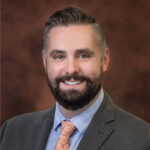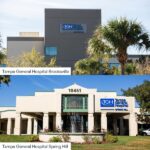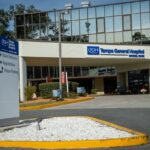 With over 1,000 applications for admission, a complete first year faculty on board and approval for preliminary accreditation granted by the Liaison Committee for Medical Education, the new College of Medicine at Florida International University is well on its way to welcoming its inaugural class in August 2009. The nations newest medical school, a public school supported with state funds, will make medical school affordable for qualified students from every segment of the South Florida community and will ultimately improve the quality of life in neighborhoods throughout the region.
With over 1,000 applications for admission, a complete first year faculty on board and approval for preliminary accreditation granted by the Liaison Committee for Medical Education, the new College of Medicine at Florida International University is well on its way to welcoming its inaugural class in August 2009. The nations newest medical school, a public school supported with state funds, will make medical school affordable for qualified students from every segment of the South Florida community and will ultimately improve the quality of life in neighborhoods throughout the region.
That is one of the goals of John Rock, MD, MPH, Dean of the FIU College of Medicine and the conceptual architect of the schools distinctive approach to medical education. Rock hopes to attract a diverse group of medical students whose cultural backgrounds will reflect the cultural mosaic that is Miami-Dade County. The schools curriculum emphasizes community health and utilizes a unique interdisciplinary team approach. Known as Neighborhood HELP (Health, Education and Learning Program), the program will send teams of medical, nursing, social work and public health students into selected neighborhoods where they will adopt households and address all the health needs of those families. Clinical and classroom experiences will integrate the community health experience and will prepare students to practice medicine with an in-depth understanding of the impact of culture on health.
According to Dr. Rock, “We have a great opportunity to create a curriculum that gives students the chance to see and experience first hand the difference that cultural background makes and how it affects the lifestyle choices that create health and illness. Our graduates will be prepared to provide care that considers the social determinants of health. Key faculty members will be people from those communities, who practice there and understand the culture. The students will see and understand the barriers that exist in peoples lives so that when a patient doesnt follow a medication regimen or follow a prescribed diet, the physician will have insight into the cultural factors that enter into it.”
Rock says that in just the first four weeks, the school received over 1000 applications for the 40 slots in the Class of 2013, with more than half coming from Florida. Students must be legal residents, as the FIU medical school is a taxpayer-supported institution. “Recruitment of students from South Florida is essential to solving the physician shortage here,” says Rock. “We need medical students who are invested in staying here and we hope that with our focus on community health, cultural diversity and primary care, our graduates will be motivated to remain here. Right now, only one quarter of medical students trained in South Florida practice here.”
Faculty recruitment is also progressing, with the entire first-year faculty in place and recruitment of department heads underway. Rock is collaborating with established community institutions in what he describes as “an urban coalition” of partners. “We are working with Miami-Dade Health Department on choosing the neighborhoods where our student teams will be located. Jackson Health System is another major public partner, and Jackson North will be the medical home for our north neighborhoods.”
Efforts to establish the new medical school began at FIU in 2004. The Florida legislature and Board of Governors granted approval for the school in 2006, and Rock was brought on board as dean last year. With a distinguished background in both medical education and public health, Rock in eminently qualified to lead the development of the fourth allopathic medical school in the state of Florida and one of just 127 in the United States.
He most recently served as chancellor and chief executive officer for Louisiana State University Health Sciences Center, where he established the School of Public Health.
The Liaison Committee for Medical Education will visit the FIU School of Medicine again for a second site visit in the second year of operation, for provisional accreditation, and will make a final accreditation survey after the inaugural class graduates in 2013.
“We are making great progress and are very encouraged by the response,” Rock says. “Its been tremendously exciting. This school will produce culturally competent physicians who will demonstrate sensitivity to the complexity of this regions diverse groups and an awareness of the health issues particular to each. The students that we seek are those that have some experience already in giving back to the community and are committed to community health.”
Post Views: 1,072
 With over 1,000 applications for admission, a complete first year faculty on board and approval for preliminary accreditation granted by the Liaison Committee for Medical Education, the new College of Medicine at Florida International University is well on its way to welcoming its inaugural class in August 2009. The nations newest medical school, a public school supported with state funds, will make medical school affordable for qualified students from every segment of the South Florida community and will ultimately improve the quality of life in neighborhoods throughout the region.
With over 1,000 applications for admission, a complete first year faculty on board and approval for preliminary accreditation granted by the Liaison Committee for Medical Education, the new College of Medicine at Florida International University is well on its way to welcoming its inaugural class in August 2009. The nations newest medical school, a public school supported with state funds, will make medical school affordable for qualified students from every segment of the South Florida community and will ultimately improve the quality of life in neighborhoods throughout the region. 
























